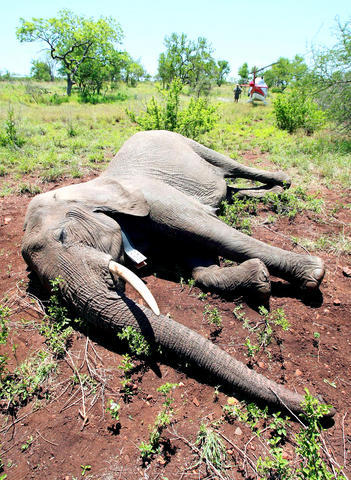South Africa will allow elephants to be killed in an attempt to control a burgeoning population, the government said, ending a 13-year ban and setting a trend that could embolden other southern African nations confronting the same dilemma.
As outraged animal rights activists threaten to promote tourist boycotts, South African Environment Minister Marthinus van Schalkwyk said on Monday the government had no choice but to reintroduce culling "as a last option and under very strict conditions."
There would be no "wholesale slaughter," he promised.

PHOTO: EPA
"Our simple reality is that elephant population density has risen so much in some southern African countries that there is concern about impacts on the landscape, the viability of other species and the livelihoods and safety of people living within elephant ranges," he said.
South Africa has been hugely successful in managing its elephant population, once on the verge of extinction in some areas. But it has become a victim of its own success and herds are growing at a rate of more than 5 percent a year and expected to double by 2020, threatening the delicate balance of nature.
There is no consensus on the continent on how to manage elephant populations. Southern African countries favor culling while East African nations such as Kenya are struggling to keep numbers up. Trade in ivory has been banned since 1989 to try to combat poaching despite appeals by South Africa to resume sales and invest the proceeds in its parks.
"We are the first country to come out and take this decision," van Schalkwyk said, adding that South Africa had consulted other countries in the region.
Monday's announcement follows months of heated debate, with some conservationists arguing that overall biodiversity should take priority and animal welfare groups outraged at the prospect of slaughter.
Van Schalkwyk said the debate was marked by "strong emotions."
The new regulations on managing elephants, effective May 1, say killing must be through "quick and humane methods," preferably by a single lethal shot to the brain by a skilled marksman from a helicopter.
The World Wildlife Fund (WWF) cautiously welcomed the government's move.
"They are doing the responsible thing," said Rob Little, acting chief executive of WWF South Africa. "It is the right choice to have culling as an option but with strong provisos."
However, Animal Rights Africa, which is threatening to promote tourist boycotts, said that killing elephants was "undeniably cruel and morally reprehensible."
Spokeswoman Michele Pickover said South Africa does not have too many elephants and that the decision by the government posed a threat to the elephant population in southern Africa.
She said: "South Africa has opened the door to en masse killing of elephants."
She argued that the decision was linked to its push to have the ban on ivory trade lifted. South Africa has huge stockpiles of ivory but if it succeeded in getting the ban lifted it would "have to keep looking for more ivory," Pickover said.
Bob Scholes, who headed the assessment report of elephant management, dismissed Pickover's claims as "irrelevant."
He said that elephants earned about 18.6 billion rand (US$2.42 billion) a year from tourists and only 1.14 billion rand in ivory, hunting and sales.
"Elephants are worth much more alive than dead," he said.

Airlines in Australia, Hong Kong, India, Malaysia and Singapore yesterday canceled flights to and from the Indonesian island of Bali, after a nearby volcano catapulted an ash tower into the sky. Australia’s Jetstar, Qantas and Virgin Australia all grounded flights after Mount Lewotobi Laki-Laki on Flores island spewed a 9km tower a day earlier. Malaysia Airlines, AirAsia, India’s IndiGo and Singapore’s Scoot also listed flights as canceled. “Volcanic ash poses a significant threat to safe operations of the aircraft in the vicinity of volcanic clouds,” AirAsia said as it announced several cancelations. Multiple eruptions from the 1,703m twin-peaked volcano in

Chinese President Xi Jinping (習近平) launched a week-long diplomatic blitz of South America on Thursday by inaugurating a massive deep-water port in Peru, a US$1.3 billion investment by Beijing as it seeks to expand trade and influence on the continent. With China’s demand for agricultural goods and metals from Latin America growing, Xi will participate in the APEC summit in Lima then head to the Group of 20 summit in Rio de Janeiro next week, where he will also make a state visit to Brazil. Xi and Peruvian President Dina Boluarte participated on Thursday by video link in the opening

China has built a land-based prototype nuclear reactor for a large surface warship, in the clearest sign yet Beijing is advancing toward producing the nation’s first nuclear-powered aircraft carrier, according to a new analysis of satellite imagery and Chinese government documents provided to The Associated Press. There have long been rumors that China is planning to build a nuclear-powered aircraft carrier, but the research by the Middlebury Institute of International Studies in California is the first to confirm it is working on a nuclear-powered propulsion system for a carrier-sized surface warship. Why is China’s pursuit of nuclear-powered carriers significant? China’s navy is already

IT’S A DEAL? Including the phrase ‘overlapping claims’ in a Chinese-Indonesian joint statement over the weekend puts Jakarta’s national interests at risk, critics say Indonesia yesterday said it does not recognize China’s claims over the South China Sea, despite signing a maritime development deal with Beijing, as some analysts warned the pact risked compromising its sovereign rights. Beijing has long clashed with Southeast Asian neighbors over the South China Sea, which it claims almost in its entirety, based on a “nine-dash line” on its maps that cuts into the exclusive economic zones (EEZ) of several countries. Joint agreements with China in the strategic waterway have been sensitive for years, with some nations wary of deals they fear could be interpreted as legitimizing Beijing’s vast claims. In 2016,